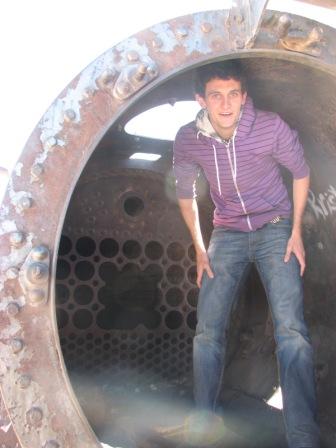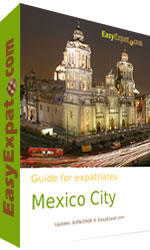From Australia to Mexico: The Philiad
 My name is Philip Johnson, I’m an Australian currently living in Mexico. I say I’m Australian but people are constantly calling this into doubt. Apparently my accent isn’t strong enough. I’m working on rehabilitating it, but still it’s disturbing how often people mistake me for a non-native English speaker (people often guess that I’m Danish for some reason).
My name is Philip Johnson, I’m an Australian currently living in Mexico. I say I’m Australian but people are constantly calling this into doubt. Apparently my accent isn’t strong enough. I’m working on rehabilitating it, but still it’s disturbing how often people mistake me for a non-native English speaker (people often guess that I’m Danish for some reason).
1. Why did you move abroad?
I never hatched any grand plans to ‘move abroad’. When I first started travelling, I ended up working and living abroad quite by chance. I was lucky to fall into the world of the English teacher, which is an easy access point to living abroad. Since that first accidental experience (living in Spain and earning under-the-table euros by teaching government employees), I’ve been living ‘abroad’ almost continuously. Once I fell into it I had no desire to climb back out.
2. How do you make a living (working? Tell us about your experience)?
Most of my time abroading has been funded by English teaching. I save money teaching, and then I go and spend it somewhere else. English teaching is a great way to do this, but it does mean following fairly strict channels. If you want to earn good money without a lot of qualifications, you pretty much have to go to Asia. I’ve been in Latin America for three years now and in that time I’ve earned quite a lot less than I earned in 1 year living and teaching in Korea. It’s getting to the point now where I’d like to leave teaching behind. Like I said, it’s a very easy introduction to living abroad, but there are also limits to what you can do with it. It seems like in most big cities of the world there is a resident English teaching community. That’s all well and good and can be very welcoming, but it can be hard to escape from this if it’s not really your thing.
3. How often do you communicate with home and how?
I communicate almost exclusively through email and Skype. I used to send postcards and still love getting them, but I guess I stopped writing them regularly as being abroad began to feel less like a trip and more like home.
When I first started travelling I didn’t like how connected the world was. I didn’t like that I could be in some obscure mountain village, and people were messaging me to ask if I was doing anything on the weekend, or poking me on facebook. Nowadays I’ve mellowed and love how connected the world is, but I still cultivate stony online silence from time to time (apart from on blog; there I’m anything but stony).
4. What's your favorite thing about being an expat in Mexico?
My salary here compared with what can be earned in developed countries is pretty low, but the standard of living is very, very high. I feel like things that are exotic or desireable in other countries are very normal here. Things like farmers’ markets full of fresh, organic, local produce, as well as very good traditional and international restaurants and bars (obviously I place a high value on food). Mexico has a wonderful blend of deep, traditional culture, and wide-eyed cosmopolitanism and engagement with the wider world.
5. What’s the worst thing about being an expat in Mexico?
People ask me about ‘The Violence’ all the time. I’m far more likely to die waiting in line to pay an electricity bill or get my visa updated than I am to die by some epic gang shootout in the streets. The bureaucracy here is really stifling. Far too much is controlled by people with no real interest in doing a good job, people who owe their job to their family connections, rather than their abilities.
This is particularly true in the telecommunications world (much of which is owned by the richest man in the world). Honestly I’ve never seen any organisation as impervious to customer satisfaction as the local phone, internet and cable company. It’s almost like they go out of their way to be unhelpful. But what choice have you got; if you want internet, you have to do what the monopoly says.
6. What do you miss most?
I think I’m beyond the point of really missing much. In other countries such as Korea and Bolivia I’ve missed the diversity of options, especially food options, offered in Australia, but I don’t feel that kind of thing so strongly these days. I guess I’m getting better at adapting, and digging deep into a place. Boosting my language ability has definitely helped (not that I’m a master…. far from it).
Of course I can say that I miss family and friends, but the thing is they’re so spread out these days that wherever I am, I’ll be missing a lot of people. I guess it’s a condition of being an expat, but more than that, it’s condition of how connected and open the world is at the moment.
7. What custom/ habits do you find most strange about your adopted culture?
One of Mexico’s best known writers Octavio Paz said (to paraphrase very roughly), that Mexico is never, ever minimal. It has an astounding depth of art, but this art is almost never delicate, subtle or understated. This is true of broader society. Why wear a belt where you can wear an epic, shiny, rhinestone-encrusted belt? Why wear heels when you can wear massive hooker boots with a tiny skirt? Why wear a little make up when you can have your whole face re-sculpted? Why watch football when you can hurl mighty abuse at a television screen, before falling to the ground in a weeping heap? Why drive a car when you can run red lights in a giant pickup? Why eat a spicy taco when you can have you throat ravaged by habanero sauce? Why grab lunch when you can have a languid multi-houred, multi-layered feast? Why have a party when you can have yourself a peda, and stay up all night emptying bottles of incendiary mescal?
8. What is a myth about your adopted country?
I’d love to be able to say that the violence in Mexico is myth, but that’s far from true. However, the image of Mexico that you see in most countries is definitely a myth. There is basically a war raging here, but that doesn’t mean I dodge bullets every day. Terms like ‘failed state’ are profoundly unhelpful and give a completely false impression of life here. This is not anarchy; if anything it’s the opposite. Too many conflicting laws and codes and orders. Too much bureaucracy and corruption. Too many people with too much (very well-organised) power and influence.
9. What advice would you give other expats?
You can trust restaurant food as much as you can trust street food! Although personally I trust street food even more; at least you can see exactly who is preparing your street food, and where they are putting their hands. Plenty of people get sick from eating in really nice restaurants. That’s not to say that street food is completely 100% safe, but it’s no more dangerous or dirty than any other food. More importantly, it’s cheap, delicious, and open until late. I would feel as though I was missing out on something very, very important if I didn’t eat street food at every opportunity.
10. When and why did you start your blog?
I started blogging when I started travelling, about 6 years ago. At first it was very much a ‘travel blog’. After a few years, as my travels were becoming slower and my stays in each place becoming longer, I broadened the blog to a general culture blog (The Philiad), although I still focus on travel – or perhaps internationalness – as much as possible .
.
I started blogging as a way of letting people know what I was doing. These days I’d say I focus less on what I’m doing then on what’s going on around me. Mexico is far more interesting than I am (and yet I persist with a blog name which is about as self-focused as imaginable).
In the beginning, travel gave me the discipline and inspiration I needed to start writing. Now the roles have reversed. My writing inspires my travelling. Through my blog, writing has become an everyday (literally every day) part of my life. I can’t imagine travelling without writing, or living abroad without writing, or trying new foods without writing. Writing is interwoven into pretty much everything I do (perhaps apart from teaching). Blogging is a big part, but not the only part of this. It has changed the way I see, interact with, and interpret the world around me. I’m a different person because of it (some would say a more annoying person, especially when my camera comes out at meal time).
 Phil's Blog, The Philiad
Phil's Blog, The Philiad
To find out more about being an expat in Mexico, read EasyExpat's Mexico City Guide
Part of the EasyExpat.com adventure since 2008. Drink, Travel, Write
